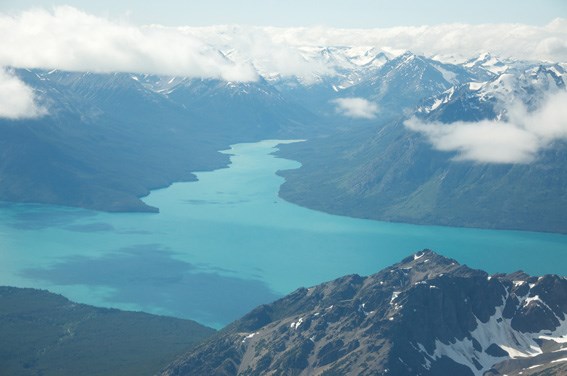Wilderness tourism operators in the Chilcotin say they are disgusted with the failure of senior governments to defend their financial investments, and vow to risk arrest rather than allow a First Nation to put them out of business.
"All of the lodge operators will be operating in 2018, with or without permits," Brian McCutcheon of ROAM Adventures and Bear Camp on Chilko Lake stated in a letter to federal and provincial ministers.
"We will challenge to have our commercial and private property rights recognized. I am sure there will be arrests, but you have pushed us to the brink of bankruptcy and leave us no other option."
The dispute arises from a 2014 Supreme Court of Canada decision granting Chief Roger William, on behalf of the Xeni Gwet'in and the greater Tsilhqot'in Nation, about 1,750 square kilometres of Crown land in the Chilcotin southwest of Williams Lake and aboriginal rights across the larger region.
The Supreme Court decision left a handful of non-native tourism operators stranded on small islands of private lands surrounded by much greater First Nation lands, and with no way to resolve conflicts, including over critical access to former Crown lands for recreation.
William said in an interview that the ecotourism operators are free to continue with the recreational activities for which they had permits previously with the province government, but that he is concerned that activities not permitted are being conducted. He noted he hasn't experienced the same level of problems with private landowners elsewhere in the territory, although one in the Nemiah Valley, Elkin Creek Ranch, is also concerned.
He said he is willing to negotiate bridging agreements that would allow operators to continue, but also noted that the Xeni Gwet'in still have to decide what they want to do with their lands long-term.
McCutcheon said a buy-out of the operators now seems the only viable option, and William is not opposed, provided senior governments cough up the cash. "If any wanted to sell, we're open to that," said William. "If B.C. and Canada are willing to cover that, we're certainly in favour. We'd work with them."
Dave Wolstenholme, owner of Chilko Lake Lodge, argued that the current situation would never happen in downtown Vancouver.
"If this was a debate over land at Georgia and Burrard, the government would have already resolved the issue," he said. "We are hopeful, but not confident, that the Canadian government will fix this injustice."
McCutcheon argues in the letter that the Xeni Gwet'in have failed to negotiate in good faith on bridging agreements and instead continue to "overstep their jurisdiction with attempts to enforce and control the region" while "effectively starving us."
He writes: "We are being stopped on roads and interrogated, having clients turned away, roads closed without notice, received cease-and-desist notices, and federal waterways are being monitored and sometimes closed by rogue rangers. We are being videotaped without our consent, have drones flying over our private property doing illegal surveillance, and have rangers entering private land to monitor us."
All the while, senior governments have moved at a "glacial pace" to find a solution, McCutcheon said.
"Our commercial properties dropped in value by 80 per cent in one year. We have lost more than 50 per cent of our revenue, and there is no agreement in place for 2018, let alone the future."
McCutcheon said the Chilko experience sends a negative message to potential investors in B.C.
The letter went to one provincial minister, Scott Fraser at Indigenous Relations and Reconciliation, and to three federal politicians: Indigenous Services Canada Minister Jane Philpott; Small Business and Tourism Minister Bardish Chagger; and Carolyn Bennett of CrownIndigenous Relations and Northern Affairs.
Communications manager Leanne Ritchie released a statement on behalf of Fraser's ministry, saying in the short term the province will work with all parties to clarify standards for bear viewing, implement a compliance approach to monitor and address concerns that arise during bear-viewing season, and work to address access issues on title lands.
The statement noted that the full transition to aboriginal title "will take several years and requires respectful engagement of all parties."
The federal government did not immediately comment.
Phil Huston is a Nebraska businessman who owns Chilko Experience. He fell in love with B.C. during a visit 40 years ago and invested in ecotourism at Chilko Lake in 2000.
"It offered everything I sought," he said. "Pristine wilderness in a stable democracy with the rule of English law. I thought I had checked all the boxes. I invested heavily and became the 'poster child' of the foreign investor all countries seek."
Today, he is soured on investment in this country. "My message to all who believe Canada is a safe country to invest in: run away very fast. It may be the worst of class because it offers the appearance of security when none exists." He accused the First Nation of "taking the stand there are too many lodges," adding that an "open policy of total economic genocide is the new status quo."
Visually stunning Chilko Lake is the largest high-elevation lake in North America. The private operators are mostly located at the north end of the lake (formerly part of Ts'ilos Provincial Park) and along the Chilko River, offering activities such as grizzly viewing, river trips, kayaking, fishing, hiking and mountain biking.
In 2014, Outside Magazine named the raft trip down the Chilko and Chilcotin rivers as best in the world.



